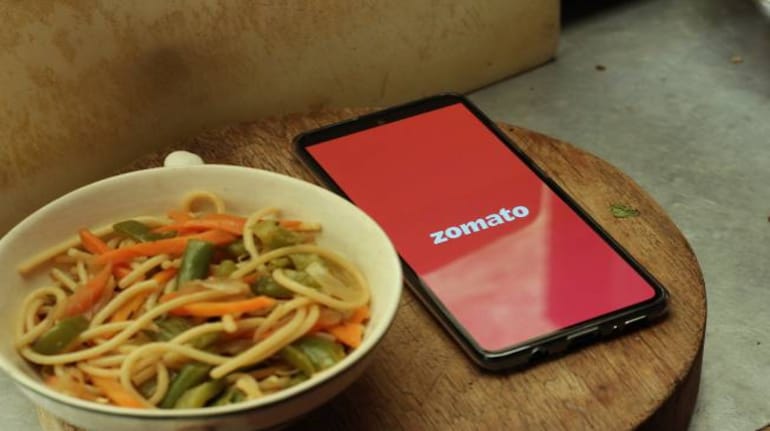



Sometime in 2010, Deepinder Goyal received an email that would change his destiny and that of the sender, Sanjeev Bikhchandani.
Bikhchandani, the founder of Info Edge, one of India's most successful listed Internet companies, and his colleague Hitesh Oberoi (who is the co-promoter and CEO of Info Edge) had been using a site called FoodieBay for many months to discover and order from restaurants in Delhi.
They thought it might be worthwhile to have a conversation with the team behind the site and see if they can invest in the company. Bikhchandani logged on to Network Solutions to find out more about the domain, saw Deepinder's name in the admin contact, and found his email id by running a Google search.
He sent him a cold email, that true to Bikhchandani's style was brief and direct. It went something like this:
Hi, I use your site and we are fans. If you are looking to raise money, contact us.
Deepinder got back in 24 hours, they met in 48 hours and shook hands in 72 hours. as the Info Edge team liked the site and the founders. On July 22, 2010, FoodieBay (which was Zomato's name then) received an investment of Rs 4.7 crore (a million dollars then) from InfoEdge, a stake that is worth a billion dollars today as the food delivery platform is set to go public. It filed for an IPO on April 28, 2021, seeking to raise $1.1 billion. InfoEdge and Zomato declined to talk about the IPO filing, citing legal constraints.
BIkhchandani when asked about this historic email exchange with Goyal responded to Moneycontrol with this comment, "The secret of successful early-stage investing is to find entrepreneurs and companies that will succeed anyway- with or without you. Zomato would have found another investor and its destiny would have remained more or less the same. But Info Edge may not have found another Zomato. So more than Zomato's destiny, perhaps it was Info Edge whose destiny was impacted by that email."
In response to a congratulatory message on Twitter that credited him for kick-starting India's tech IPO cycle twice - with Info Edge then and Zomato now, he responded, "The credit should go to the Zomato team. Our skill lies in merely identifying great teams and putting in money. Money is a commodity. Entrepreneurship is rare."
Zomato began its journey as FoodieBay in 2008, when its co-founders Deepinder Goyal and Pankaj Chaddah, both graduates of IIT-Delhi, became colleagues and friends at Bain & Company. They decided to make it easier to order lunch at work by scanning and creating an online directory of restaurant menus. When more and more colleagues started using their directory to order food at work, they realised that this was more than a side project. They quit Bain in November 2009 and focussed on their venture full-time.
Over the next year, Foodiebay would go to list over 8,000 restaurants on its website, with plans to go beyond restaurant directory listings to become a recommendation engine that would suggest the best places for dining out and food delivery. This is around the time when it decided to change its name- from Foodiebay to Zomato.
"We saw that if we wanted to touch broader horizons then the name “Foodiebay” wasn’t going to be the best option since it might restrict our perception as just a food website. Another thought that was at the back of our minds was to prevent any overstepping of eBay when we start accepting online payments. So we decided to keep the idea of food at the centre but choose a name that is timeless and encompassing. We decided on the name Zomato. Zomato’s got a zing to it and is originally a play on the word Tomato. Zomato is not restricted to food either," Deepinder said in a blog post on November 13, 2010.
While the name was changed to reflect a wider offering, Zomato after various acquisitions, strategy tweaks, and experiments over the years, is back to- food. Be it discovery, delivery, table booking, building loyalty through its membership program- it has decided to focus on its core competence- food.
According to its draft red herring prospectus, proceeds from the IPO will be used for customer acquisition, investing in delivery, technology, and acquisitions. Its rival Swiggy on the other hand is using the on-demand tech and delivery infrastructure that it has built for food delivery to expand into categories like grocery through Instamart and hyperlocal delivery through Swiggy Genie.
According to Zomato's DRHP, 10.7 million customers ordered food every month in India in FY20. It has 1.61 lakh active delivery partners and 1.31 lakh active restaurants for food delivery in FY20. Apart from Info Edge, the other significant shareholders in Zomato include Sequoia Capital, Ant Financial, Tiger Global and Uber (which holds shares in Zomato through the latter's acquisition of UberEats India). Deepinder owns a 5.5 percent stake in the company.
Discover the latest Business News, Sensex, and Nifty updates. Obtain Personal Finance insights, tax queries, and expert opinions on Moneycontrol or download the Moneycontrol App to stay updated!
Find the best of Al News in one place, specially curated for you every weekend.
Stay on top of the latest tech trends and biggest startup news.